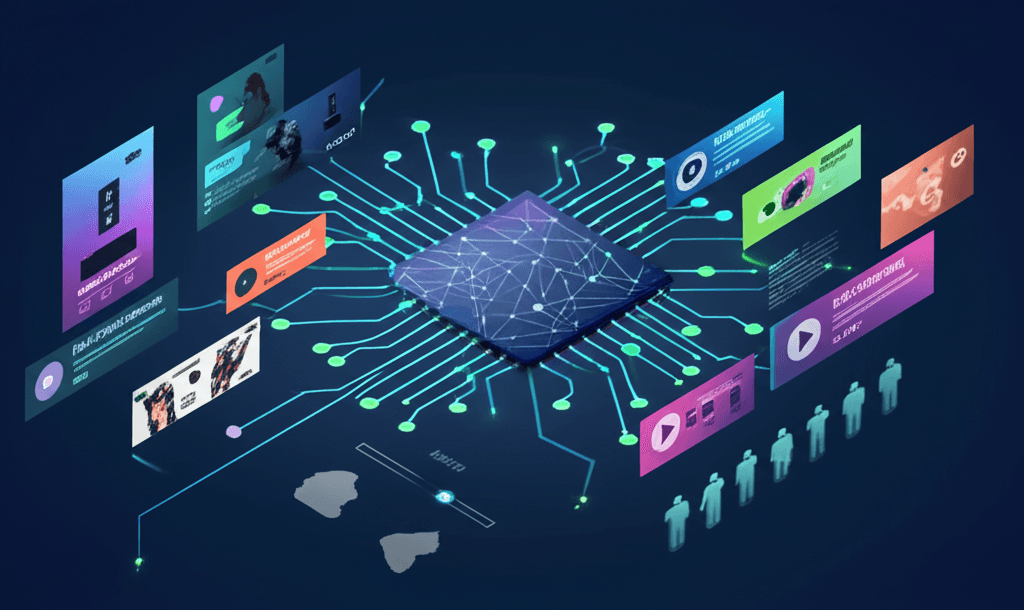Meta's AI to Fully Create and Target Ads by 2026, Redefining Marketing
The tech giant plans to fully automate ad creation and targeting by 2026, reshaping marketing and igniting industry debate.
June 4, 2025

Meta Platforms is reportedly on a path to revolutionize its advertising business by enabling artificial intelligence to fully create and target advertisements across its platforms, including Facebook and Instagram, by the end of 2026.[1][2][3][4][5][6][7] This ambitious initiative would see AI take over the entire campaign process, from generating ad creatives like images, videos, and text, to deciding which users to target and suggesting budget allocations, potentially reshaping the digital advertising landscape and the roles of marketers and agencies.[1][2][8][3][4][9]
The core of Meta's reported strategy involves developing advanced AI tools that would allow a brand to simply provide a product image or business URL and a budgetary goal.[1][2][3][4][9][6] From these basic inputs, the AI system would be capable of crafting complete ad campaigns.[1][2][3][4][9] This includes generating all necessary visual and textual content, determining the optimal audience on Facebook and Instagram, and even recommending how to allocate the budget for maximum impact.[2][3][4][9][6] A significant feature of this upcoming system is its reported ability to personalize ads in real-time, meaning users could see different versions of the same promotion based on factors such as their geolocation or other individual data points, thereby enhancing relevance and engagement.[2][3][10][11][6][12][7] This marks a substantial leap from Meta's current AI capabilities, which primarily assist in tweaking existing ads or generating variations rather than creating entire campaigns from scratch.[2][3][11][5] Advertising is a critical revenue stream for Meta, accounting for over 97% of its overall revenue in recent years, and these AI advancements are aimed at further solidifying its position in the market.[2][4][9][5]
This move toward fully automated, AI-driven advertising is an extension of Meta's ongoing investment in AI and its existing suite of tools like Advantage+.[8][3][10] The Advantage+ platform already utilizes AI for campaign optimization, assisting with budget allocation, insight generation, and audience targeting.[10] Meta has been progressively integrating generative AI features, allowing advertisers to create image backgrounds, write copy variations, and test different ad formats.[1][8] The company has reported positive results from these existing AI tools, with a 22% improvement in return on ad spend for advertisers utilizing them and a significant increase in the number of advertisers using its generative AI offerings.[2] CEO Mark Zuckerberg has been vocal about his vision for AI in advertising, suggesting a future where businesses can simply state their objectives and connect their bank accounts, letting Meta's AI handle the rest, effectively redefining the advertising category.[1][2][10][13] Meta has outlined that its current ad systems already use multiple AI-powered functions, like Meta GEM, Lattice, and Andromeda, which analyze user responses, manage ad inventory exposure, and learn individual preferences to deliver more relevant ads.[14] The company is investing heavily in the necessary infrastructure, including data centers and custom AI chips, to support these advanced capabilities across its platforms that serve billions of users globally.[2][3]
The implications of such a shift towards fully AI-generated advertising are multifaceted and significant for the entire industry. Proponents suggest it could democratize advertising, particularly benefiting small and medium-sized businesses (SMBs) that often lack dedicated advertising infrastructure or extensive marketing teams and budgets.[2][8][3][11][9] The promise is that AI can make ad creation more accessible, efficient, and potentially more effective, leveling the playing field.[2][8][3] However, the move also raises concerns within the $600 billion global ad industry.[8] There are worries about the future roles of human copywriters, designers, media buyers, and traditional advertising agencies.[8] While Meta's Chief Marketing Officer, Alex Schultz, has stated that these AI systems are intended to assist agencies and that there will still be a vital role for human creativity and strategy, anxieties about job displacement and the devaluing of creative skills persist.[8] Some ad executives have expressed skepticism about relying entirely on Meta's AI for performance metrics, suggesting a lack of trust when the platform essentially "checks its own homework."[15] Furthermore, some larger brands have voiced caution about ceding creative control to AI, with concerns about maintaining brand safety, the specific aesthetic of human-made campaigns, and the quality of AI-generated content, as AI tools can sometimes produce distorted or off-brand visuals that require refinement.[3][11][15] Ensuring that AI-generated ads align with brand guidelines and avoid biases present in training data are also critical challenges.[13][16]
Meta's push into fully AI-automated advertising is occurring within a highly competitive landscape. Other social media platforms like Snap, Pinterest, and Reddit are also increasing their investments in AI and machine learning to attract advertisers.[3][10][7] Tech giants such as Google and OpenAI are simultaneously rolling out their own sophisticated AI tools for image and video generation, like Google's Veo and Imagen, and OpenAI's DALL-E and Sora, though their widespread adoption specifically for advertising is still evolving.[3][10][11][17] Meta itself is reportedly looking for ways to integrate such third-party AI capabilities into its platform.[11] Zuckerberg has emphasized positioning Meta at the forefront of the AI revolution, focusing on delivering measurable results at scale for advertisers.[3][17][12] This strategy is seen as crucial for Meta to maintain its dominance in digital advertising against rivals like TikTok and Amazon.[17] The company has already begun testing some generative AI ad features with select advertisers, signaling a phased rollout leading up to the full implementation projected for 2026.[2]
In conclusion, Meta's reported plan to enable AI to fully create and manage advertising campaigns by 2026 represents a bold step towards automating a complex creative and strategic process. While this technological advancement promises increased efficiency, personalization, and accessibility, particularly for smaller businesses, it also brings forth significant questions and challenges for the advertising industry regarding creative control, job roles, brand integrity, and the overall quality and trustworthiness of AI-generated content. The coming years will reveal how effectively Meta can implement this vision, how advertisers will adapt to these powerful new tools, and the ultimate impact on the broader digital marketing ecosystem.
Sources
[7]
[8]
[10]
[11]
[12]
[15]
[16]
[17]